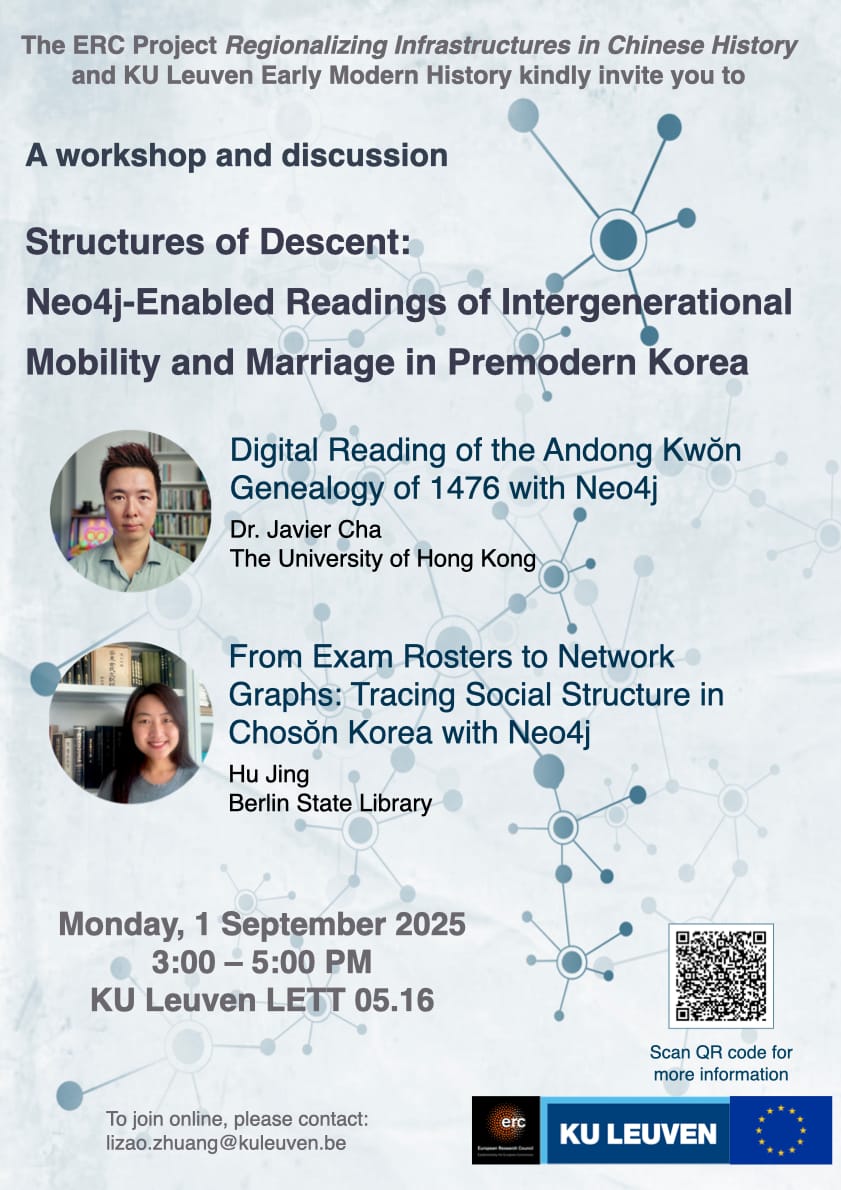
The ERC Project “Regionalizing Infrastructures in Chinese History” and KU Leuven Early Modern History Research Group organized a workshop and discussion with Dr. Javier Cha (University of Hong Kong) and Hu Jing (Berlin State Library). The workshop, titled Neo4j-Enabled Readings of Intergenerational Mobility and Marriage in Premodern Korea took place on Monday, September 1, from 3:00 to 5:00 PM at KU Leuven.
Digital Reading of the Andong Kwŏn Genealogy of 1476 with Neo4j
Dr. Javier Cha (The University of Hong Kong)
This workshop introduces a graph-based approach to “digital reading” through the case of the Andong Kwŏn Genealogy of 1476. This source is known for its reliability and its extensive records of descendants of both sons and daughters. Nonetheless, the genealogy’s organizing principle prioritizes male descent, which constrains the historian’s ability to identify relationships that cut across the compiler’s delineations, particularly affinal ties and multi-generational connections extending beyond four or five generations. Using Neo4j, a graph database management system, I demonstrate how structural shifts in in-group marriage can be identified through the aggregation of diffuse elements scattered across multiple pages and sections.
I also situate this case study within broader debates about the role of computation in historical research. It forms part of my larger argument about “digital (re)reading”—that is, that a digital environment, if designed thoughtfully and used effectively, enables new ways of reading historical sources and supports queries that would be very challenging, if not impossible, to pursue using printed materials, manuscripts, and other non-digital media.
Bio: Javier Cha is Assistant Professor of Digital Humanities in the Department of History at the University of Hong Kong. Previously, he was a founding member of the Leiden University Centre for Digital Humanities and taught at the interdisciplinary College of Liberal Studies at Seoul National University. He has been awarded more than $1.3 million in grants and fellowships from the Hong Kong Research Grants Council, the Academy of Korean Studies, the Korea Foundation, Seoul National University, the University of Hong Kong, and the Social Sciences and Humanities Research Council of Canada.
Cha is a digital historian who uses technology to explore a world one millennium ago from a novel perspective and aims to prepare today’s historical profession for an era of data abundance and automation. As a medievalist of East Asia, he applies advanced query mechanisms and large language models for machine-assisted digital readings of primary sources, facilitating explorations beyond the scope of traditional methods. Since 2019, he has operated the Big Data Studies Lab, where his team addresses the challenges posed by big data and artificial intelligence in the humanities. His collaborative research on the energetics of digital information and big data (with Ian M. Miller) will appear in the forthcoming volume of the Debates in the Digital Humanities series. Cha is also working on a retrieval-augmented compound system for AI-enhanced intellectual history of Neo-Confucianism and the French Enlightenment (with Motasem Alrahabi, Donghyeok Choi, and Glenn Roe).
Cha is the guest co-editor of the special section on “Digital Korean Studies” for Korean Studies (2023, with Barbara Wall) and the upcoming special issue on “Artificial Intelligence and the Digital Humanities” for the International Journal of Humanities and Arts Computing (2025, with Miguel Escobar Varela). He is currently writing two monographs: Yangban as Graphs: Networks of Patronage and Marriage in Medieval Korea and Future-Proofing the Past: Big Data and the Transformation of Historical Practice.
For more about Cha, please visit https://javiercha.com/.
From Exam Rosters to Network Graphs: Tracing Social Structure in Chosŏn Korea with Neo4j
Hu Jing (Berlin State Library)
Examination rosters in the Chosŏn dynasty served not only as official proof of a candidate’s success but also as attestation of the candidate’s lineage. For candidates from secondary status groups, where compiling genealogies was uncommon, these rosters provide crucial insights into a candidate’s family background.
Drawing on lineage data extracted from 104,191 state examination records, I built social networks of civil officials, military officers, and technical specialists, comprising 175,938 nodes and 123,483 edges. I used Neo4j to manage this large-scale dataset. This graph-based approach allows for both querying and visualization of large-scale network data, offering macro- and micro-level perspectives on the structure among examination candidates.
This workshop will introduce how Neo4j can be used to generate, query, and visualize lineage data. I will demonstrate through two case studies: (1) the role of examination structures in shaping chungin clan networks, and (2) patterns of social mobility from the seventeenth century onward, with special attention to the downward mobility of military officers (muban) after the Imjin War (1592–1598). Participants will also be introduced to key Cypher queries and functionalities in Bloom, Neo4j’s visualization tool, as practical methods for exploring and interpreting large-scale network data.
Bio: Hu Jing is a social historian of Korea and a specialist in digital Korean studies. She received her MA in Cultural Informatics from the Academy of Korean Studies in 2014. After working as a researcher at Renmin University of China for two years, she pursued doctoral studies at Leiden University (2016–2022) and continued them at KU Leuven (2022–2025). Between 2022 and 2024, she was a researcher in the ERC project Aftermath of the East Asian War of 1592–1598, hosted by the Autonomous University of Barcelona. Since January 2023, she has been Subject Specialist for Korean Studies at the Berlin State Library. Her research interests include the social history of Korea, particularly marginal social groups, and the application of digital humanities methodologies to historical research.